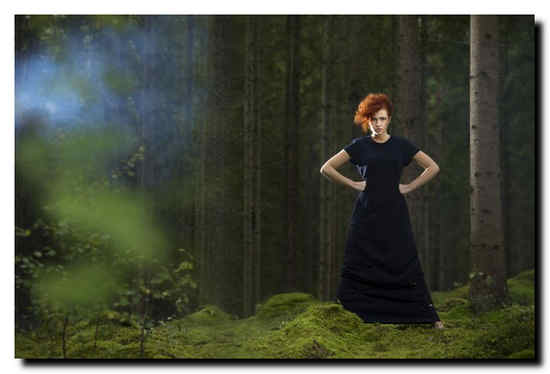A dress completely made of paper from Swedish forests and Nordic Paper. The innovation project ‘Establish locally grown textiles in Sweden’ aims at enabling textile production of raw material from the pulp industry.

Wood becomes paper, which is turned into fabrics. By using knowledge and skills from classical Swedish industries, such as Nordic Paper, wood can be refined into locally produced textiles. This gives new business opportunities for the domestic industry in Sweden and creates opportunities for a more sustainable textile industry through a range of innovative solutions across branches.
In the provinces of Värmland, there are dense forests of spruce and pine trees. This Swedish forest raw material is processed and refined into paper by Nordic Papers. The unbleached and locally grown paper is then shipped to the textile cluster in the Sjuhärad region, where it is spun into threads at SKS Textile and then turned into fabrics via knitting machines at the Swedish School of Textiles in Borås. At the dyeing company Sjuhäradsbygdens Färgeri, the fabric is given a dark blue colour and is then turned into a flexible dress at Smart Textiles at the University of Borås.
This sounds almost like a fairy tale, but is actually a description of some of the results of the project ‘Establishing locally grown textiles in Sweden’ (Swedish: ENTIS) in BioInnovation, where a number of parties from the Swedish forestry, paper, and textile industry work together to achieve textile production of raw materials from the pulp industry.
“There are already textiles made of paper, but the unique thing about this project is that we have looked at the possibilities for recycling and challenge existing production and recycling techniques to achieve a circular flow. One of the greater challenges in the production of a paper fabric is to knit with the paper yarn instead of weaving with it, since paper is a relatively stiff material. It is also fun to see the collaboration of a project with parties from different branches, and I am also looking forward to see prototypes for interior purposes emerge in this project”, says Lena-Marie Jensen, team leader of ‘Design for recycling’ and project coordinator of the focus area Sustainable Textiles in Smart Textiles.
Paper – a durable and locally grown raw material
The need for textile fibres grows as the population of the earth increases (UN: 9.2 billion in 2050) and the general standard of living is higher. As people settle in cities and afford to consume more, the needs for sophisticated textiles also increase. This is why one finding of this project is that we need to take care of the raw material we have and reuse it. But there is also a need to supply new sustainable raw material that could be part of a circular flow.
- As paper producer we are proud of being part of the project. This is in line with what we do every day, working for bioeconomy. It there is a possibility to make clothes out of our paper, we are thrilled since clothes is something that everyone needs every day. This is a new and exciting way of using our paper compared to the more tradtional applications, such as sacks, bags and steel interleavingpaper, says Marie Stenquist, communication manager at Nordic Paper.
This project wants to highlight the importance of constantly investigating alternatives to cotton and synthetic fibres in order to get more resource efficient fibres, and how choices in the design process affect the product’s environmental performance. In order to solve the fibre needs of the future, we need a variety of solutions where paper could be one alternative to some products. Paper is also a bio-based material in our immediate surrounding and could be part of a closed cycle.
More information about the project: BioInnovation is one of Sweden’s strategic innovation programmes, which includes the project ‘Establishing locally grown textiles in Sweden’ (Swedish: ENTIS), led by Swerea IVF. Smart Textiles are responsible for the work package ‘Design for Recycling’, where the goal is to enable textile production of raw materials from the pulp industry. This will bring increased opportunities for Sweden to assume a strong position in the globally growing, bio-based economy with forests, fields, water, and waste as a basis. This could then create better conditions, both for sustainability and for the Swedish industry.
